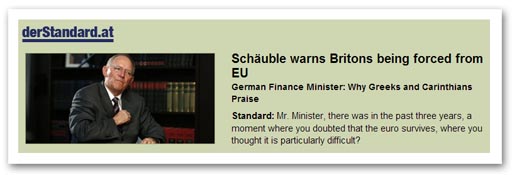His concern, though, is not primarily for the UK. "Try to imagine", he adds, "explaining to, for example, an Indonesian, that Europe is an incredibly strong, dynamic entity but that it is not in the position to keep a globally oriented member such as Britain. The damage to our reputation alone would be a catastrophe".
This, then, is a German who speaks with forked tongue. At one he is a man at the forefront of pushing for a "federal" Europe, yet on the other hand consistently offers emollient words about Britain not leaving the EU.
The last time he did this was in December when he declared that he would wish for more British involvement in Europe, not less, while cautioning that any attempt to "blackmail" Germany with threats of an exit would not be tolerated.
We thus appear to have an instance here where we take more note of what a politician does, rather than what he says. His words may say "in", while his actions so far have been calculated to push Britain towards the exit.
He would prefer, on the one hand, that Britain agrees with everything the EU throws at it – such as the limits on Bankers' bonuses – but then says he does not want the British to be driven out at the end of the EU, while doing nothing to stop it happening.
But then, in his current interview, he says that he "cannot support the voices in German politics that imagine an EU without the UK". This suggests a domestic agenda. Whatever he might actually feel about the UK, it is not politically advantageous to him to be seen to be driving it out of the EU.
Hence, we get the honeyed words. But, as FAZ once observed, he is a master of empty language (Sprachgirlande). The words mean nothing.
This, then, is a German who speaks with forked tongue. At one he is a man at the forefront of pushing for a "federal" Europe, yet on the other hand consistently offers emollient words about Britain not leaving the EU.
The last time he did this was in December when he declared that he would wish for more British involvement in Europe, not less, while cautioning that any attempt to "blackmail" Germany with threats of an exit would not be tolerated.
We thus appear to have an instance here where we take more note of what a politician does, rather than what he says. His words may say "in", while his actions so far have been calculated to push Britain towards the exit.
He would prefer, on the one hand, that Britain agrees with everything the EU throws at it – such as the limits on Bankers' bonuses – but then says he does not want the British to be driven out at the end of the EU, while doing nothing to stop it happening.
But then, in his current interview, he says that he "cannot support the voices in German politics that imagine an EU without the UK". This suggests a domestic agenda. Whatever he might actually feel about the UK, it is not politically advantageous to him to be seen to be driving it out of the EU.
Hence, we get the honeyed words. But, as FAZ once observed, he is a master of empty language (Sprachgirlande). The words mean nothing.
